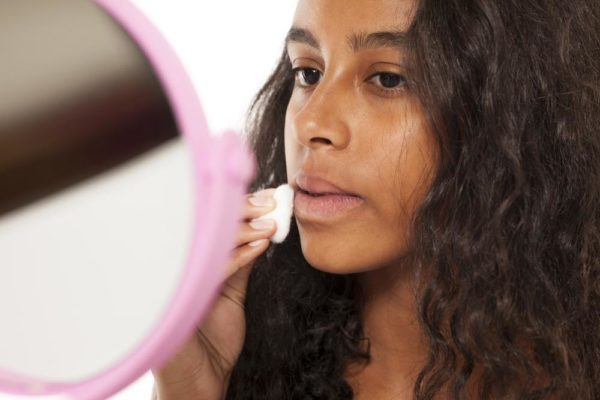Features
Dr Dami: Why Your Cleanser Could Be Making Your Acne Worse
 Have you ever wondered why your acne doesn’t seem to get better despite using so many recommended products? Maybe you’ve tried everything from spot treatments, to creams, to antibiotic tablets and still no difference. I’d like you to consider the first stage of your skincare routine- ‘Cleansing’ and ponder with me if just maybe your cleanser could be making your acne worse.
Have you ever wondered why your acne doesn’t seem to get better despite using so many recommended products? Maybe you’ve tried everything from spot treatments, to creams, to antibiotic tablets and still no difference. I’d like you to consider the first stage of your skincare routine- ‘Cleansing’ and ponder with me if just maybe your cleanser could be making your acne worse.
You see, cleaning our face is very important in removing dirt, make up, bacteria and dead skin. It also provides a clean surface, which allows subsequent treatments to penetrate the skin better.
In cleansing the face, two main options are available, soaps or synthetic detergents (syndets).
What is the difference?
Let me take you back to chemistry class: true soaps are made by mixing a strong alkali with an oil or fat in a process called ‘saponification’. The resulting product is a combination of predominantly salts, fatty acids and alkali, which have a pH of 9-10.
A syndet on the other hand is a combination of different detergents or surfactants, manufactured by a process other than ‘saponification’. As a result, the final product has a slightly acidic or neutral pH, (around 5.5), making them very gentle for use in baby skin as well as eczema or psoriasis skin.
So I’ve mentioned ‘pH’ twice now. Let me clarify for the majority of us who are not chemistry geeks. pH stands for potential of Hydrogen, and refers to the amount of free hydrogen atoms in a solution. It ranges from 0 – 14, with water being neutral at pH 7, an acid having a pH less than 7 and a base or alkali a pH greater than 7. Another important thing to note, is that pH is ’logarithmic’ which means that each pH level is a factor of 10 such that a pH of 5 is 10 times lower than a pH of 6, 100 times lower than a pH of 7, 1000 times lower than a pH of 8 and so on.
So why is all this pH talk relevant anyway?
You see our skin has a slightly acidic pH of between 5.3 – 5.9, and it pretty much likes to remain that way. Hence, when we use alkaline products with pH’s above 7, we are greatly offsetting the pH balance of the skin especially when you look at it in ‘logarithmic terms’.
By using alkaline products, we can distort our skin barrier by damaging the proteins in the topmost part of the skin which causes us to loose excessive water, resulting in dry skin. Some people may think this is great, especially if they have oily skin. However, drying out the skin simply triggers the oil glands to produce even more oil, which can exacerbate acne. Furthermore, skin that is dry is also more prone to irritation.
Most worrying than this, is the fact that high pH products (>7), provide an environment that is conducive for the growth of acne causing bacteria (p. acnes), which eventually worsens acne you are trying to fight off to begin with.
Is there really any evidence for this?
Yes, there is. In fact, two studies by Korting and colleagues and Subramanyan and colleagues, showed an improvement in the number of acne lesions when a ‘syndet’ type of facial cleanser was used as opposed to a typical soap. The converse was also true, such that acne lesions increased when conventional soaps were used.
So how can we identify these so called ‘syndets’?
One way to do this is to look at the names by which they are marketed. If a product has been labelled ‘soap free’, a ‘beauty bar’ or ‘cleansing bar’, it is likely it is a ‘syndet’. A more sure way, however, of identifying them, is by going through the list of ingredients to see if you can spot any of the following ‘syndet’ ingredients:
- Sodium cocoyl isethionate (most common),
- Sodium cocyl monoglyceride sulphate,
- Sulfosuccinates,
- Betaines,
- Alpha olefin sulfonates or
- Alkyl glyceryl ether sulfonate
Because many of us won’t be bothered to look through these long tongue twisting names, I have decided to provide a non-comprehensive list of some examples :
- Dove Sensitive skin beauty bar
- Cetaphil Gentle cleansing bar
- Eucerin pH5 soap-free bar
- Aveeno moisturising bar
- Uriage eau thermal xemose gentle cleansing syndet
- Uriage extra-rich dermatological syndet bar
- Vanicream cleansing bar
- Seba med cleansing bar
- Cerave hydrating cleansing bar
- La Roche-Posay Lipikar Syndet soap free cleansing gel
Most of these products can be purchased from retail pharmacies such as Boots in UK. Cetaphil, Aveeno and Vanicream are more easily obtained in the US, whilst I’m unsure as to if Medplus in Nigeria stock some/all of the above. If you happen to find any of the above in Nigeria, please be a darling and mention in the comments section.
So there you have it, another way to fight this acne battle. Please do not hesitate to ask any questions related to this article.
Stay blessed and stay beautiful.
References
http://www.sebamed.fr/client/document/infection_94.pdf
https://www.ncbi.nlm.nih.gov/pmc/articles/PMC3366450/
https://www.linkedin.com/pulse/soap-vs-syndet-chris-holmes
http://www.snowwhiteandtheasianpear.com/2015/10/mating-habits-of-molecules-secret-life.html
http://www.snowwhiteandtheasianpear.com/2014/09/skincare-discovery-why-ph-of-your.html
http://www.anothermaria.com/2014/09/best-syndet-bar-brands-skin/
https://rosacea-support.org/syndets-and-lipid-free-cleansers-what-are-they-do-they-work.html
Photo Credit: Vladimirfloyd | Dreamstime

























